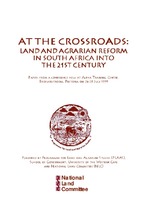At the crossroads: Land and agrarian reform in South Africa into the 21st century
Abstract
These conference proceedings are published at a time of extraordinary fluidity and uncertainty as to the future of the ambitious programmes of land and agrarian reform1 initiated by the first democratic government in 1994. A number of fundamental questions are currently being asked within the sector:
What is the future of land and agrarian reform in South Africa in the 21st century? Some observers assert that the African National Congress (ANC) government has effectively jettisoned land reform, without actually announcing this decision to the world at large. If .agrarian questions., including but not limited to questions as to the nature and distribution of land rights, are seen as marginal by those holding state power, then what are the implications for rural people, for land activists, and for the politics of land and agriculture in democratic
South Africa?
Alternatively, will land and agrarian reform be re-oriented so that its central focus is the fostering of a class of small, medium and largescale black commercial farmers? If so, will government attempt to alleviate rural poverty primarily through welfare programmes and expanded social services rather than through the transfer of productive assets and support for wealth-creating productive activity?
If at least some elements of land and agrarian reform continue to be oriented to the needs of the rural poor, what lessons from the first five years need to inform the design and implementation of more effective policies and programmes?
These are challenging questions, but important ones to seek answers to. The papers in this collection may assist in such efforts, despite significant shifts in the political context between the early months of 1999, when the papers were written, and March 2000, as these proceedings go to press. The most obvious difference, of course, is the appointment of a new
Minister of Agriculture and Land Affairs, Thoko Didiza (formerly Deputy Minister of Agriculture). However, the policy implications of this change in leadership are only just beginning to emerge, with the Minister announcing a major new policy thrust on 11 February 2000

